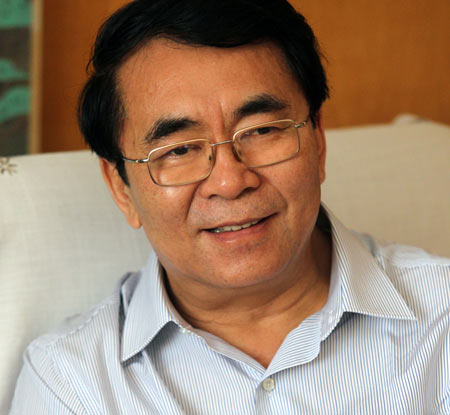| News & Events |
| Location:Home > News & Events > Science and Technology News |
| Appliance of science 'needs innovation' |
 Bai Chunli, president of the Chinese Academy of Sciences. Unorthodox approach will pay dividends, leading expert predicts They say great minds think alike — but that's the last thing Bai Chunli wants. As president of the Chinese Academy of Sciences, he says what the country's scientific community needs most is diversity, not uniformity. "When we say someone is trying to do things in an unorthodox way, it's usually derogatory," the 58-year-old chemist said. "But in terms of scientific and technical innovation, you have to be unorthodox, think out of the box, break new ground. Otherwise, innovation is just a hollow word." Established in November 1949, the CAS is the highest scientific institution in China. It now has 60,000 employees working in 12 branch offices, more than 100 institutes, more than 100 national key laboratories and national engineering research centers, and about 1,000 field stations nationwide. However, its capacity for innovation has been repeatedly questioned. In 2005, Premier Wen Jiabao visited renowned space scientist Qian Xuesen, who asked: Why has no university in China managed to develop a way to cultivate innovative talent? Qian died in 2009, but his question centers on a topic raised time and again, most recently in June when President Hu Jintao gave a speech and emphasized scientific and technological innovation as a driving economic force. "Modern science came to China only about 100 years ago," Bai said. "With the influence of war and the ‘cultural revolution' (1966-76), the time scientists have had to do research has not been very long. "Added to this, the management of our scientific research has problems," he added. According to Bai, one of the problems is that previous research investment attached too much importance on buying research instruments, and ignored human resources, which means China's researchers are paid relatively low salaries. The poor wages of researchers led to another result — scientists have to seek subsidies from funds for scientific research projects. The government allocated 228.55 billion yuan ($36.18 billion) to scientific research in its 2012 budget. Funding is up on last year when it was 203.41 billion yuan and 172.83 billion yuan in 2010. The money is split among various beneficiaries, including public welfare projects, as well as funds to improve research conditions or support State-owned institutes. Except for the fixed amount for institutes, money from other funds is distributed through research projects set by authorities, which are open for research teams to compete for. "For scientific exploration, researchers need to be able to cast off any interruption and concentrate on study," Bai said. "However, now lots of energy is wasted on competing for projects, receiving assessments and reviews, and coping with all kinds of non-scientific affairs." More than 55 percent of Chinese scientists who responded to a poll by the China Association for Science and Technology said they spend less than four hours a day on research. Meanwhile, a CAS survey found that researchers spend on average 18.9 percent of their working time dealing with non-scientific affairs. Only 36.7 percent is actually spent on study. Moreover, a shortage of technical staff means scientists also waste time on maintaining equipment. "A researcher's time is split into short periods, which breaks the continuity of thinking and thus hinders their achievements," Bai said. He also complained that some have got into the habit of blindly competing for projects "because they simply want more projects". Although bidding for projects can be fierce, completing them is not that challenging, he said. "Personally I haven't heard of any scientists failing in any final checks on research projects," Bai said. Also, in recent years, the experience of leading national-level projects is seen as useful in assessing professional quality. "Does a professor's ability to fight for government financial support equal their academic level? Of course not, but this is how things work now," the CAS president said. "Under such an assessment system, one's ability to acquire financial support exceeds his or her innovation capacity. "This explains why our scientists are so eager for quick success, and why they resort to academic fraud so often." To change the situation, Bai made a series of reforms at the CAS. Last year, the academy allocated one-third of its headquarter-controlled funding directly to affiliated institutes, and this year set new assessment criteria. "Instead of distributing the money with specific projects, we require institutes to clarify their research directions. Different institutes should not overlap," Bai said. After receiving the money, institutes are required to ensure their scientists have enough time and financial support, while the CAS assesses performance based on the value of any findings. "I suggest increasing the fixed financial support for research institutes and cutting those invested in research projects," Bai said, adding that the money allotted by the government to the CAS only covers 50 percent of outlay, whereas the percentage is higher in developed countries. "Some projects sponsored by authorities overlap, so it is necessary to clarify the different functions of different programs, and thereby avoid reiteration on the distribution of resources," he added. "Also, we should both simplify the approval procedure of government-invested projects and avoid using the project experiences as criteria to judge one's academic achievements." |
| Appendix Download |
|
|